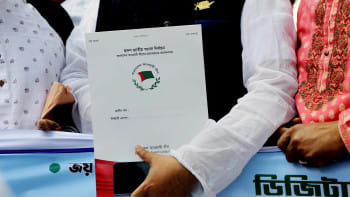Explaining the potential exodus of funds from Bangladesh

Historically, Bangladesh's financial account averages an inflow of about 2.5 percent of GDP. But in 2022-23, it experienced an outflow of 0.5 percent of GDP, which is quite a significant reversal. This has prompted the IMF to express concern that Bangladesh might have experienced capital flight in the last financial year.
While the total shipment value of exports from the Export Promotion Bureau recorded under the balance of payment grew by 6.3 percent year-on-year in FY23, the receipts recorded by the Bangladesh Bank based on forex deposits at commercial banks increased only marginally relative to the previous year. As a result, unrealised export proceeds increased to 2.1 percent of GDP in the fiscal year. So, short-term trade credit could have sharply turned negative due to delayed repatriation and repayment of export proceeds. Interestingly, in one of its footnotes, the IMF mentions that while a number of factors could have contributed to the sudden divergence of financial account performance, high unrealised export proceeds historically point to capital flight.
It goes without mention that capital flight is not a new phenomenon for Bangladesh. In December 2021, the Global Financial Integrity reported that the country lost approximately $8.27 billion on average annually between 2009 and 2018 from mis-invoicing of values of import-export goods by traders, to evade taxes and illegally move money across international borders. And so, the mismatch highlighted by the IMF could indicate that capital flight in FY23 has increased even more.
Now, the obvious answer to why that may be is the upcoming elections. According to the IMF, "exporters reportedly choose to withhold brining their proceeds back into the country until the results of the election are finalised"—and the same could be true for others too, who may also be waiting see whether it is safe for them to bring their wealth back into the country post-election.
But there is another important factor here, which the Bangladesh Bank mentioned in its Financial Stability Report 2022. It said, "…emerging market and developing economies (EMDEs) may face the possibility of capital flight if the advanced economies increase their policy rates further in the near future"—as capital seeks higher yields in those countries due to higher interest rates. It also warned that "a sudden reversal of cross-border capital flow could occur due to an increase in geopolitical tensions"—which Bangladesh is unwillingly, but increasingly, becoming a part of.
The economic repercussions of capital flight are manifold. Firstly, it syphons resources that could have been utilised for productive measures within the country, out of the country. It creates exchange rate pressure, which leads to inflationary pressure and increased cost of imports. The impact it has on foreign exchange also creates pressure on the government to rely on external borrowing. These are all realities that Bangladesh has had to grapple with in recent years.
The issue of capital flight has been receiving renewed attention around the world, as several developing countries have been experiencing this as they make the transition to market economies. One recent study shows that capital flight from Africa—mainly driven by trade mis-invoicing—has led to much lower private investment (another problem Bangladesh has been suffering from). It has also exacerbated "declining domestic investment in productive activities, declining capital stock across nearly all productive sectors, macroeconomic austerity and vulnerability, and deindustrialisation of the economy, further entrenching unemployment, poverty, and extreme inequality in the provision of basic services." And these would also hold true in Bangladesh's case.
There are a number of factors that are leading to capital flight from Bangladesh. Corruption, political impasse and instability, as well as irrational and sudden policy changes leading to investor apprehension are just some of them. Private agents view a high level of capital flight as a failure of macroeconomic policy and the institutions in charge of economic regulation. In that sense, private money would flee domestic instability and elevated sovereign risk.
Economists have highlighted that the illegal outflow of capital is used to acquire property abroad or in conspicuous luxury consumption. A government report titled "National Strategy for Prevention of Money Laundering and Combating Financing of Terrorism 2019-2021" had identified the top 10 countries where tainted money is syphoned from Bangladesh. A number of international organisations have also noted how Bangladeshis are increasingly buying properties in countries such as the UK, Dubai and other foreign countries.
That capital flight and embezzlement of funds from the banking sector have increased hand-in-hand since 2008 is also telling. It indicates that much of the funds that have been fraudulently taken out of banks have most likely been syphoned out of the country. The fact that the authorities and policymakers do not appear to be fully aware of, or admit to, the impact of illicit financial outflows have had on Bangladesh points to either ignorance or deliberate collusion between corrupt public officials with private business interests and the political establishment.
It is important to note that Bangladesh has made substantial advancements in its legal framework to curb money laundering. The issue, therefore, is the lack of government initiative in effectively enforcing these regulations. Under the condition of anonymity, a number of government officials have said that the Bangladesh Financial Intelligence Unit, Anti-Corruption Commission and other state agencies are unable to investigate allegations of money laundering against influential persons for various reasons, including lack of independence and because the perpetrators are well-connected and are being protected.
According to a former Bangladesh Bank governor, "An integrated initiative of six relevant organisations in the financial sector is needed to stop money laundering." And while coordination among them is essential, what they also need desperately is independence to investigate, pursue and prosecute individuals/groups—the majority of whom happen to be powerfully placed—for their involvement in money laundering. The nexus formed between these money launderers and those in high positions—who are protecting them—must be broken.
Eresh Omar Jamal is a journalist at The Daily Star. His X handle is @EreshOmarJamal
Views expressed in this article are the author's own.
Follow The Daily Star Opinion on Facebook for the latest opinions, commentaries and analyses by experts and professionals. To contribute your article or letter to The Daily Star Opinion, see our guidelines for submission.

 For all latest news, follow The Daily Star's Google News channel.
For all latest news, follow The Daily Star's Google News channel. 






Comments